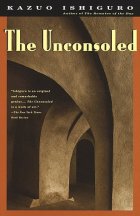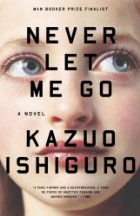
Having loved all his other novels, I finally got around to reading Ishiguro's The Unconsoled, and boy, was it strange and wonderful. I'd heard a vast array of opinions about this book, from "It is one of my top ten novels of all time" to "I loved it in a tense, uncomfortable way" to "it was an unmitigated train wreck." It's always intriguing to me when a book attracts such a wide variety of reactions, so I was looking forward to The Unconsoled for that reason. It also just so happens that I read Ishiguro in what you might call "increasing order of weirdness," and I had heard that this is indeed his weirdest book. There is something deeply satisfying about continuing my trajectory in this way, although at this point I doubt it's sustainable any longer - it would be quite a challenge to write a stranger book than this one.
Of course, many of its strange qualities have been explored before. The surreality, the language of dreams and nightmares in which the protagonist tries in vain to accomplish simple tasks, the sudden and confusing shifts in setting and perspective, the garbled rationale and bizarre priorities of the natives in a strangely familiar city: all of these elements have been combined and recombined to create the "Kafkaesque" genre. That said, this book does all of these things in a way that seems more tense and fluid than many other dreamlike stories I've read. Ishiguro really captures the shifting sands of perception that mark a dreamlike consciousness. At the same time, he manages to maintain cohesion within the narrative - just barely, at times, but he manages it. Sometimes the balance between the surreality and the sense of coherent character and voice, feels like a virtuosic juggling act that the performer is just barely pulling off; the audience is poised at the edge of their seats, transfixed at the intricate patterns traced by the juggled objects, and simultaneously nervous that they will, at any moment, come crashing down on the performer's head.
Appropriately, then, the main character of The Unconsoled IS a performer: Ryder, a famous English pianist revisiting a city which may or may not already be familiar to him, where he is supposed to give a performance which may or may not be very important in a variety of ways. One of the things I loved about this novel was the unique way that relationships slid in and out of focus; a few pages after seeking out the daughter of an acquaintance in a café, Ryder will gradually "remember" more and more details about her. Although it is at first implied that they have just met, they are soon having conversations that suggest a long history of mutual resentments and shared hopes, attacking and reassuring each other in a manner reminiscent of a (dysfunctional) long-term relationship. Ryder's own emotions and thought processes regarding the happiness and mental health of the woman's son, Boris, achieve a level of intensity more appropriate to a stepfather than a chance acquaintance, and Boris' own reactions to Ryder indicate a deep desire for approval reminiscent of a neglected child. At the same time, the closeness of Ryder's relationships with mother and child is never explicitly stated, and seems to wax and wane unpredictably throughout the novel.
In a similar vein, the life stories of different characters start to mirror and imitate one another in eerie and intriguing ways. Having been drawn into a conversation with the hotel porter, Gustav, about how Gustav has fallen into the habit of never speaking directly to his daughter, Ryder gradually adopts the same practice toward Boris, his sometime-son. Witnessing the fraught relationship between the hotel manager Hoffman and his son Stephan either suggests to or reminds Ryder of his own nebulous connection with his parents, who may or may not be arriving in the unnamed city to hear him play the piano for the first time in many years. The reader is never sure the extent to which the conversations and stories going on around Ryder create his perceived world, the extent to which he is extrapolating his own story outward onto those around him, and the extent to which a more complex dynamic is at work. The primal fears involved in many of these interactions (rejection by parents, arriving unprepared for important performances, the sudden realization that one's actions have been wildly inappropriate) add another level to the question of what Ryder is "half-creating" and what he perceives; there is a sense that we may be caught in an uncontrollable spiral, continually creating the worlds we dread through the very act of dreading them.
This sense of inappropriate behavior is a constant throughout The Unconsoled, and it runs the gamut from exhilarating to horrifying to surprisingly unexceptional. Nobody seems to notice, for example, when Ryder shows up to a fancy dress event in his dressing gown and slippers, and Ryder himself is strangely nonreactive when a journalist and photographer who are interviewing him commence talking about him as if her weren't present, planning how they will flatter and distract him into making unwise publicity decisions. On the other hand, he is horrified when the mourners at a funeral stop their sobbing to flock around him and deluge him with manic adulation, searching their pockets for refreshments to offer him and castigating themselves for having only a small piece of cellophane-wrapped cake. In one of my favorite scenes in the novel, Ryder and his wife-or-maybe-just-casual-acquaintance Sophie attend a late-night showing of 2001: A Space Odyssey - an alternate-universe version of the film involving interstellar gunfights between Yul Brenner and Clint Eastwood, who star as the astronauts who must dismantle HAL. The atmosphere in the theater is depicted as almost carnivalesque, with people laughing, talking, playing cards in the aisles, and, most bizarrely, rolling onto their backs with their legs in the air, shrieking with mirth, whenever anyone needs to inch by their seats. This is the flip-side to the terrifying or disconcerting abandonment of logical behavior in other sections - a giddy, liberating feeling which pervades the theater and lets the locals, as the hotel manager puts it, "unwind."
But the strangest narrative quirk of The Unconsoled is the way in which Ryder occasionally takes casual notice of a long, complicated back-story just by looking at a person, in the same way that he might notice a runny nose or a lipstick smudge. The first time this happens, as Gustav is showing him around his hotel room, I found the trick strangely disorienting, and actually doubled back to see whether I had missed a small phrase such as "I found out later" or "he would go on to tell me." But as I went on with the novel and similar incidents followed, it struck me as a very clever way to play with narrative. Readers are already familiar, after all, with narrators who notice small physical details about people they're observing, and even make assumptions or draw conclusions based on those observations. The next (il)logical step, in a novel of surreal perceptions taken to grotesque heights, is the ability to simply perceive another person's thoughts, feelings, past or present actions simply by looking at or thinking about them. So, for example, Ryder can take casual notice of Gustav's preoccupied air in the hotel room, and also casually notice that the porter is worried about his daughter, who has been handing off her son on certain days so that she can do errands, and then (Gustav has reason to believe) not doing the errands after all. Similarly, he can be waiting in the car with Boris while Stephan Hoffman runs an errand at a woman's apartment, and tell us how he watches Stephan climb the stairs and ring the bell, then recount his conversation with the woman as he enters the apartment and follows her down the hall, recounting the interior design as well as the conversation. Then, in case the reader is thinking that Ryder must have followed Stephen into the apartment after all, he writes that his attention was recalled by a noise made by Boris, and goes on to interact with the boy within the confines of the car. The liquidity of perception here is masterfully done, and once I cottoned on to this unique little trick, I quite enjoyed the experience of having the narrative stretch and balloon in unexpected and sometimes humorous directions.
Just as Ryder describes audiences reacting to the ultra-modern musical pieces performed in the novel, I loved The Unconsoled on a purely aesthetic basis. I'm not sure what lasting messages or morals I'll take away from it, beyond a sense of the universality of human fears and fallibility, but the tense, intriguing mood and skewed, shadowy universe it created are still tangible to me days after closing the covers.



